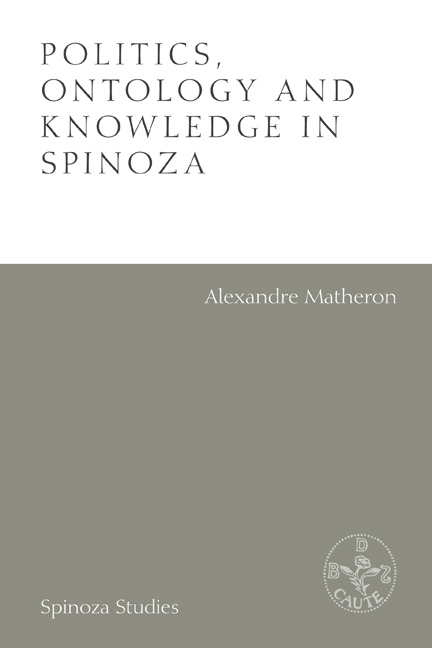Book contents
- Frontmatter
- Contents
- Abbreviations
- Notes on Translation and Acknowledgements
- A Revolutionary Beatitude: Alexandre Matheron’s Spinozism
- I Spinoza on Ontology and Knowledge
- 1 Idea, Idea of the Idea and Certainty in the Tractatus de Intellectus Emendatione and the Ethics
- 2 Essence, Existence and Power in Part I of the Ethics: The Foundations of Proposition 16
- 3 Physics and Ontology in Spinoza: The Enigmatic Response to Tschirnhaus
- 4 The Year 1663 and the Spinozist Identity of Being and Power: Hypothesis on a Development
- 5 Eternal Life and the Body According to Spinoza
- 6 Intellectual Love of God, Eternal Part of the amor erga Deum
- II Spinoza on Politics and Ethics
- 7 State and Morality According to Spinoza
- 8 Ethics and Politics in Spinoza (Remarks on the Role of Ethics IV, 37 Scholium 2)
- 9 Indignation and the Conatus of the Spinozist State
- 10 Passions and Institutions According to Spinoza
- 11 The Problem of Spinoza's Evolution: From the Theologico-Political Treatise to the Political Treatise
- 12 Is the State, According to Spinoza, an Individual in Spinoza’s Sense?
- 13 The Ontological Status of Scripture and the Spinozist Doctrine of Individuality
- 14 Spinoza and Power
- 15 Spinoza and Property
- 16 Spinoza and Sexuality
- 17 Women and Servants in Spinozist Democracy
- 18 The ‘Right of the Stronger’: Hobbes contra Spinoza
- 19 The Theoretical Function of Democracy in Spinoza and Hobbes
- 20 Spinoza and the Breakdown of Thomist Politics: Machiavellianism and Utopia
- Appendix 1 Interview with Laurent Bove and Pierre-François Moreau
- Appendix 2 Chronology of Works by Matheron
- Works Cited
- Index
Appendix 1 - Interview with Laurent Bove and Pierre-François Moreau
Published online by Cambridge University Press: 03 October 2020
- Frontmatter
- Contents
- Abbreviations
- Notes on Translation and Acknowledgements
- A Revolutionary Beatitude: Alexandre Matheron’s Spinozism
- I Spinoza on Ontology and Knowledge
- 1 Idea, Idea of the Idea and Certainty in the Tractatus de Intellectus Emendatione and the Ethics
- 2 Essence, Existence and Power in Part I of the Ethics: The Foundations of Proposition 16
- 3 Physics and Ontology in Spinoza: The Enigmatic Response to Tschirnhaus
- 4 The Year 1663 and the Spinozist Identity of Being and Power: Hypothesis on a Development
- 5 Eternal Life and the Body According to Spinoza
- 6 Intellectual Love of God, Eternal Part of the amor erga Deum
- II Spinoza on Politics and Ethics
- 7 State and Morality According to Spinoza
- 8 Ethics and Politics in Spinoza (Remarks on the Role of Ethics IV, 37 Scholium 2)
- 9 Indignation and the Conatus of the Spinozist State
- 10 Passions and Institutions According to Spinoza
- 11 The Problem of Spinoza's Evolution: From the Theologico-Political Treatise to the Political Treatise
- 12 Is the State, According to Spinoza, an Individual in Spinoza’s Sense?
- 13 The Ontological Status of Scripture and the Spinozist Doctrine of Individuality
- 14 Spinoza and Power
- 15 Spinoza and Property
- 16 Spinoza and Sexuality
- 17 Women and Servants in Spinozist Democracy
- 18 The ‘Right of the Stronger’: Hobbes contra Spinoza
- 19 The Theoretical Function of Democracy in Spinoza and Hobbes
- 20 Spinoza and the Breakdown of Thomist Politics: Machiavellianism and Utopia
- Appendix 1 Interview with Laurent Bove and Pierre-François Moreau
- Appendix 2 Chronology of Works by Matheron
- Works Cited
- Index
Summary
Laurent Bove: Your reading of Spinoza, whether one follows or disputes it, is today a major reference in Spinozist scholarship. When did you begin working on Spinoza and what, at that time, was the state of scholarship on the Dutch philosopher?
Alexandre Matheron: I began studying Spinozism in 1949 when I enrolled in a diplôme d’études supérieures (the equivalent of a master's degree today) and wrote a thesis on Spinoza's politics. From what I can tell, it was the first on the subject. It was, however, very bad: it was purely and simply a very dull paraphrasing of the Political Treatise and the final chapters of the Theologico-Political Treatise. But my main concern wasn't Spinoza, really. At that time, I was a member of the Communist Party (which was still at the time very Stalinist), I had just joined, and I was looking for a philosopher that could be considered a precursor to Marx. I was looking to treat this question in a dogmatic Marxist way: beginning with productive forces and relations of production, moving on to political structures, ideological currents, class struggles etc., and finally arriving at philosophy … To be clear, I did not do that in my master's thesis, but I planned on doing it afterwards … and, of course, I never did! I began to think of my actual dissertation when I was already an assistant professor at the University of Algiers, at the end of the 1950s and the beginning of the 1960s. The state of Spinoza scholarship in France, at the time, was basically non-existent. I remember being invited, a few years later, to a preparatory meeting with [Louis] Althusser for a seminar on Spinoza that was supposed to take place (and which never happened) …
LB: What year was that?
AM: I no longer recall what year it was, but it was after the publication of Reading Capital. [Pierre] Macherey was there, [Alain] Badiou as well, and I already knew their names. And it was also before May ‘68.
- Type
- Chapter
- Information
- Politics, Ontology and Knowledge in Spinoza , pp. 353 - 382Publisher: Edinburgh University PressPrint publication year: 2020

